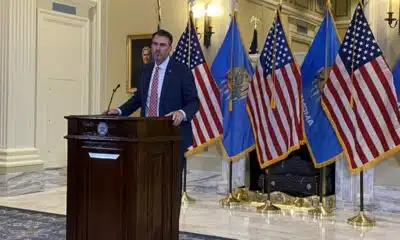News from the South - Georgia News Feed
Ban on cell phones in Georgia’s early grades awaits governor’s signature
Ban on cell phones in Georgia’s early grades awaits governor’s signature
by Ross Williams, Georgia Recorder
April 24, 2025
There may be a lot fewer likes, comments and subscriptions coming out of Georgia schools next summer when a ban on cell phones for all elementary and middle schoolers is set to go into effect during the school day, pending Gov. Brian Kemp’s signature on a bill.
Ban backers say there will also be a lot fewer distractions and disciplinary problems once devices are out of kids’ hands.
A promising pilot
A handful of districts around the state have implemented their own phone bans. DeKalb County Schools has launched a pilot program in 17 of its schools as part of its “Disconnect to Reconnect” initiative launched in August. Darnell Logan, the district’s director of student relations, said the initial results have been very promising.
During the first semester of the program, the pilot schools saw a 70% drop in student referrals for district due process hearings – hearings for when a school wants to suspend a student for more than 10 days – as well as a 15-16% decrease in suspensions.
Logan said the district already had a policy against using cell phones in class, but before the program, teachers had a hard time enforcing the rule with each of their students. Now, the kids lock up their devices at the start of the day – about half of the participating schools have a phone locker in the classrooms and the other half use special phone locking pouches from a company called Yondr.
Logan said the program was not an immediate hit with students and some parents.
“It varied, you know, the students, of course, were not for the pilot process,” he said. “Parents also had concerns. The main concern for parents was they talked about safety. They felt they needed to be able to contact their students anytime if something was to happen at the school.”
But he said the district stressed to parents that they could get in touch with their students by calling the schools and that procedures are in place for emergencies – for example, administrators are able to unlock the storage devices so students can access their phones after evacuating to a safe place.
Verdaillia Turner, president of the Georgia Federation of Teachers and a former classroom teacher, said she hears the safety argument from parents but rejects it because she says mass shootings are the exception, while teachers are flooded with disciplinary and academic problems caused by kids on phones every day.
Turner said kids are showing declines in imagination and attention span, which she blames on cell phones and social media.
“How many hours are these kids on their phones and their computers, and how are they using them? You tell me why a child needs a cell phone. Parents who complain about the cost of various educational apparatus and educational support that they should be adding are the same folk that’s paying money for cell phones.”
Logan said his team is conducting regular interviews during the pilot, and even some of the students are coming around to the ban.
“Of course there’s kids who say they don’t like it, but then those same kids who don’t like it have also said ‘it does help me focus or pay attention, it has helped me to be more sociable,’” he said. “Kids have stated that they have made new friends and talked to people that they normally would not have talked to because they were so engaged on their phone scrolling during the school day.”
Some students try to get around the ban – either by finding creative ways to open the pouches or locking up a decoy phone and keeping their real one in their pocket – but a few ne’er-do-wells don’t spoil the overall benefit, Logan said.
“Even if those things happen, we are still not seeing students readily pulling out their phones, using the phones during the school day,” he said. “Our ultimate goal was to hit 75 to 80% of our students with this initiative, and we’re truly reaching that at this point. Because if you walk into a school that is doing our Yondr pilot program, you’re not going to see phones out as you would have in previous school years.”
Nia Batra, a member of the Georgia Youth Justice Coalition and a student at Decatur High School, said she’s a fan of her school’s phone ban. She said the policy there is to lock up phones at the beginning of every period – more lenient than the pending bill, which would call for a ban between the first and final bells.
Batra said unplugging, even for just the school day, can help students dealing with anxiety or other issues and help them focus on their academics instead of what their friends are up to.
“We know that anxiety and depression is rising because of the constant use of smartphones, and especially since the pandemic, students just don’t have face-to-face conversations with each other. It’s really difficult to get students to engage with one another,” she added.
“After the ban, a lot of people are actually going like, ‘now I’m actually focusing on my learning, I’m getting work done in class, I’m less stressed about it, I can actually focus on what’s going on,’” she added. “So there’s a little bit of personal, like, ‘OK, yeah, this actually benefits me.’”
‘Real school safety measures’
While she supports keeping cell phones away during school hours, Batra said the safety argument resonates with her and a lot of other children.
“We had a lockdown last year in our school after a gun went off,” she said. “I remember hiding under my desk. I was texting my parents and my sister, like, ‘I love you, and I don’t know what’s going on. I’m really scared.’ And so whenever I have to put my phone in a box, I’m thinking about that. I’m thinking about what if something were to happen again, and I can’t text my family? We just had the deadliest school shooting in Georgia.”
Batra was speaking about the September shooting at Apalachee High School in Winder that took the lives of two students and two teachers.
The shooting has changed a lot for Layla Renee Contreras, including her thoughts on school cell phone bans. Contreras is lead organizer for Change for Chee, an organization pushing for safety improvements in the wake of the shooting. She’s also an Apalachee High School graduate, and her mother and sister were at the school during the shooting.
“Technology is part of our new normal and it’s going to be,” she said. “Kids need to realize that there’s a time and place for cell phones and during school isn’t one of those, but it shouldn’t be taken off of their person in case of an emergency.”
Contreras said safety protocols like unlocking storage devices after an evacuation may be well intentioned, but may not be followed during a chaotic situation like a school shooting.
“Teachers, being part of a procedure, grabbing a cell phone box is not going to be the No. 1, it really isn’t,” she said. “I definitely want to have it be part of that, but the way the kids and teachers described to me, it was just a matter of protecting themselves and getting to a safe spot. They’re not going to be worrying about XYZ grabbing a specific list or a box of cell phones. It’s a matter of life or death, and the kids having it on their person already, I mean, that’s the quickest way, to just have it on them.”
Contreras said she would like to see lawmakers take action on gun storage laws or a database on student disciplinary problems that can follow students when they transfer schools.
The teenage suspect in the Apalachee shooting was interviewed by law enforcement a year before the attack regarding threatening social media posts targeting another school in Jackson County, but that information did not follow him when he transferred to Barrow County.
Lawmakers passed a bill this year with sweeping provisions aimed at preventing another shooting, including requirements that schools quickly send transfer student records to their new district, but some major provisions were stripped out, including the creation of a statewide database on students who may pose threats.
State lawmakers have proposed bills to encourage Georgians to buy gun lockers and other storage devices through a tax credit or to create a law punishing people whose improperly stored guns are accessed by minors and used in a crime. Neither bill moved forward this year.
“To be honest, this is a performative ban, because the phones aren’t the enemy here, inaction is, and we need to be talking about real school safety measures,” Contreras said. “That could look like more gun safety laws or seeing a threat database be installed and put into place or addressing more root causes of mental health.”
Though she supports the ban, Batra said she doesn’t feel especially supported by lawmakers either.
“When we’re talking about health and safety, if we’re not making the same investments in counselors and gun safety as we are for phones, it makes us feel like they care more about our test scores than our actual lives,” she said. “It’s not about our mental health as far as phones, it’s about what level of achievement can we generate.”
YOU MAKE OUR WORK POSSIBLE.
Georgia Recorder is part of States Newsroom, a nonprofit news network supported by grants and a coalition of donors as a 501c(3) public charity. Georgia Recorder maintains editorial independence. Contact Editor John McCosh for questions: info@georgiarecorder.com.
The post Ban on cell phones in Georgia’s early grades awaits governor’s signature appeared first on georgiarecorder.com
Note: The following A.I. based commentary is not part of the original article, reproduced above, but is offered in the hopes that it will promote greater media literacy and critical thinking, by making any potential bias more visible to the reader –Staff Editor.
Political Bias Rating: Center-Left
The content presents a discussion on the school cell phone ban in Georgia, with both proponents and opponents of the measure being represented. The narrative focuses on the educational benefits of the ban, with some comments on the safety concerns voiced by students and parents in light of school shootings.
The article includes a perspective from Verdaillia Turner, president of the Georgia Federation of Teachers, who emphasizes discipline issues rather than focusing on safety concerns. Meanwhile, Layla Renee Contreras, an organizer focused on school safety, calls for stronger gun safety measures and a database for disciplinary issues, critiquing the phone ban as “performative.”
The article leans toward advocating for more substantial safety measures, such as improved gun safety laws and addressing mental health issues, rather than just implementing a cell phone ban. This suggests a policy stance that tends to favor more interventionist approaches to addressing systemic issues, placing it in the center-left category. The inclusion of multiple viewpoints helps maintain some balance, but the focus on the broader need for systemic safety reforms and critiques of performative measures indicates a slight tilt toward progressive ideals.
News from the South - Georgia News Feed
Richmond Hill votes to roll back millage rate
SUMMARY: Richmond Hill City Council voted to roll back the millage rate from the proposed 4.132 to 3.981, avoiding a nearly 4% property tax increase. This decision followed several public hearings where residents expressed concerns about rising housing costs and the impact of higher property taxes on affordability. Critics questioned the city’s spending, citing funds tied up in unused land and city hall renovations amid infrastructure issues. Georgia law requires public hearings for maintaining or increasing millage rates. Mayor Russ Carpenter emphasized careful financial planning to balance taxpayer relief with maintaining essential city services.
The post Richmond Hill votes to roll back millage rate appeared first on www.wsav.com
News from the South - Georgia News Feed
Teen girl, mother killed in ‘domestic murder-suicide’ | FOX 5
SUMMARY: In Johns Creek, a man, James Choi, killed his wife Mia and their 15-year-old daughter Grace, a sophomore at Mount Pisgah Christian School, before taking his own life. Police discovered the family’s bodies during a welfare check at their Glencastle Court home. The tragic incident shocked the local community and school families, who expressed disbelief and sorrow. Mount Pisgah Christian School released a statement emphasizing support for students’ emotional health and extended condolences to the family. Authorities continue to investigate but confirm there is no ongoing threat to the community. The tragedy deeply affected students, parents, and staff alike.
Three family members, including a teen, were found dead in Johns Creek home. Police believe James Choi, 52, killed his wife and daughter before taking his own life. Authorities say the incident is isolated and their investigation remains ongoing.
Subscribe to FOX 5 Atlanta!: https://bit.ly/3vpFpcm
Watch FOX 5 Atlanta Live: https://www.fox5atlanta.com/live
FOX 5 Atlanta delivers breaking news, live events, investigations, politics, entertainment, business news and local stories from metro Atlanta, north Georgia and across the nation.
Watch more from FOX 5 Atlanta on YouTube:
FOX 5 News: https://www.youtube.com/playlist?list=PLUgtVJuOxfqkmrF1fONNmi8nKI0Z-FPE-
FOX 5 Atlanta I-Team: https://www.youtube.com/playlist?list=PLUgtVJuOxfqlb_I16wBwizoAoUsfKEeWB
Good Day Atlanta: https://www.youtube.com/playlist?list=PLUgtVJuOxfqlKT5xsbsPFgr5EBzdsWTvG
FOX 5 Extras: https://www.youtube.com/playlist?list=PLUgtVJuOxfqli-5MS_2X-i6bNGWvV0RYP
You Decide: https://www.youtube.com/playlist?list=PLUgtVJuOxfqnCKb7UkRde2NXuaoPEAXut
Download the FOX 5 Atlanta app: https://www.fox5atlanta.com/app
Download the FOX 5 Storm Team app: https://www.fox5atlanta.com/storm
Follow FOX 5 Atlanta on Facebook: https://facebook.com/fox5atlanta
Follow FOX 5 Atlanta on Twitter: https://twitter.com/FOX5Atlanta
Follow FOX 5 Atlanta on Instagram: https://www.instagram.com/fox5atlanta/
Subscribe to the Morning Brief and other newsletters from FOX 5 Atlanta: https://www.fox5atlanta.com/email
News from the South - Georgia News Feed
Why winner of $1.3 billion Powerball jackpot won’t be an instant billionaire
SUMMARY: The Powerball jackpot has risen to an estimated $1.3 billion after Monday’s drawing, marking the sixth time it has surpassed $1 billion and ranking as the fifth-largest Powerball jackpot ever. Despite the huge figure, winners don’t receive the full amount due to federal and state taxes, which can withhold about 37% of the prize. The advertised jackpot reflects the annuitized payout over 30 years, currently estimated at $820.3 million after taxes in states without lottery tax, while the lump sum cash option is about $589 million before taxes. Powerball drawings occur thrice weekly with odds of 1 in 292.2 million.
Read the full article
The post Why winner of $1.3 billion Powerball jackpot won't be an instant billionaire appeared first on www.wsav.com
-
Mississippi Today3 days ago
DEI, campus culture wars spark early battle between likely GOP rivals for governor in Mississippi
-
News from the South - Louisiana News Feed6 days ago
K+20: Katrina alters local health care landscape, though underlying ills still the same
-
News from the South - North Carolina News Feed6 days ago
Parasocial party: Why people are excited for the Taylor Swift, Travis Kelce engagement
-
Our Mississippi Home7 days ago
The Great Backyard Recovery – Helping Birds After the Storm
-
News from the South - Alabama News Feed7 days ago
Katrina displaced 1.5M across the South, only 61% returned to New Orleans | Louisiana
-
Local News Video5 days ago
08/29 Ryan's “Wet End to the Week” Friday Forecast
-
Local News6 days ago
Police say Minneapolis church shooter was filled with hatred and admired mass killers
-
The Center Square7 days ago
U-M Health ends transgender treatment for minors | Michigan









































